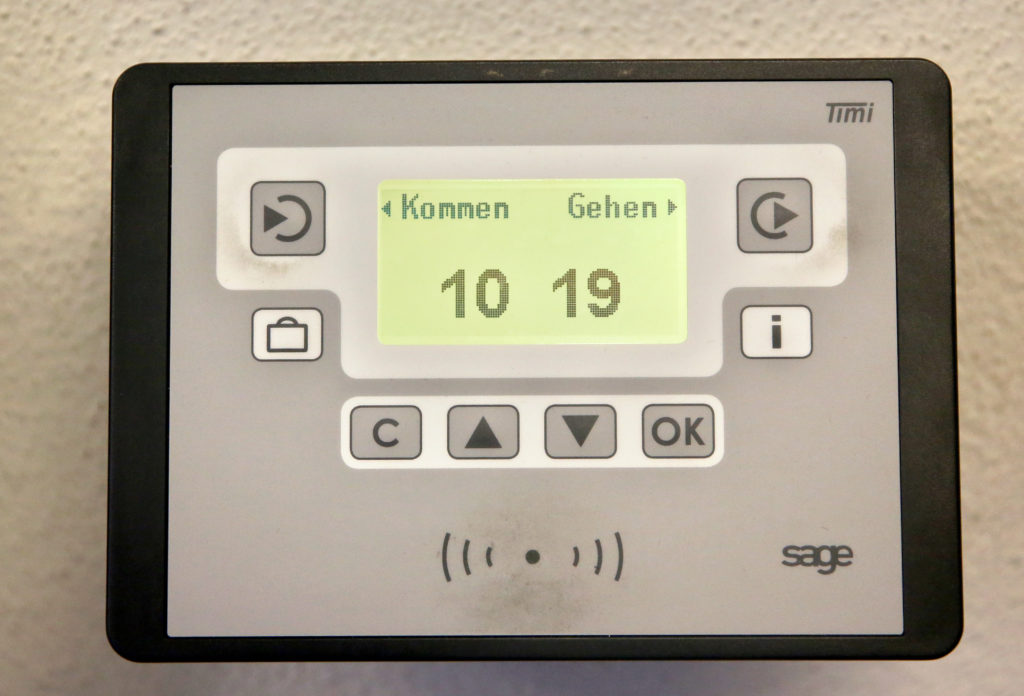What’s happening?
Last week, the Federal Labour Court (BAG) declared that employers in Germany should be recording the working hours of all employees.
READ ALSO: Why German employers will soon have to record staff working hours
The decision brings into force a 2019 ruling by the European Court of Justice (ECJ), which stated that employers in member states should be implementing systems to record how many hours per week employees were working, which until now, has not been brought into law by the German government.
The main reason for this, according to the ECJ, is to protect staff from excessive working hours and unpaid overtime.
What are the consequences of the ruling?
Labour Law specialist Dr. Michael Fuhlrott explained to The Local that the ruling has an immediate legal effect: the court decided that the ECJ ruling means that the German Occupational Health and Safety Act must now be interpreted in such a way that it includes an obligation to record working hours.
“In other words, the obligation applies directly, to every company with immediate effect,” Fuhlrott said.
Updating the German law book to include the original judgement of the European Court of Justice from 2019 had been on the coalition government’s agenda for some time, but was put on hold due to the pandemic. When a relevant case came to the Federal Labour Court, the judges took the opportunity to address this gap in the law.

But in the absence of a written law, it’s unclear exactly how the new rules will be enforced.
Dr. Fuhlrott said: “There is currently a high degree of uncertainty as to how the ruling is to be understood. We will have to wait for the court’s exact reasoning. In view of this current lack of clarity, companies should first wait for the exact reasoning behind the decision and then consider how to respond to it.”
It seems unlikely, for example, that the decision will give employees a right to take legal action against employers for not enforcing mandatory working time logs. But what could happen, is that authorities could start to check up on companies to see if they are keeping tabs on their staff’s working hours. Though in the absence of clear government regulations, this also seems unlikely.
READ ALSO: Jobs in Germany: Should foreign workers join a union?
One thing that is clear, however, is that the federal government is now under pressure to define exactly how the law will work.
Speaking to the Süddeutsche Zeitung, Labour Lawyer Philipp Byers said “it creates enormous legal uncertainty, which the German government must now urgently address.”
When it comes to bringing in new legislation to incorporate the ECJ decision, it’s likely that there will be a little bit more room for manoeuvre when it comes to defining exactly how the law will work.
It may be possible that companies that operate on a “trust model” will be able to keep some degree of flexibility in the way time recording is carried out.
A spokesman for the German Labour Ministry told the Local that any further consequences of the ruling can only be fully assessed after the court publishes its reasoning for the decision. That is expected in the coming weeks.
“The Federal Ministry of Labour and Social Affairs will examine this and is working on a corresponding draft law,” a spokesman said.
What’s the reaction from people in Germany?
Following the decision, a survey conducted by the opinion research institute Civey for T-online, showed that the majority of Germans see the development as a good thing.
In answer to the question, “How do you view the fact that all employees will have to record their working hours in the future?” 61 percent of respondents answered either “very positively” or “positively” while only 22 percent responded with the answer “negatively” or “very negatively”. A total of 17 percent were undecided.
However, there is lots of disagreement on the ruling. On the one hand, it could strengthen workers’ rights and help prevent unpaid overtime, while on the other, it introduces a significant bureaucratic hurdle for workers and organisations which have previously operated on a “trust model” of timekeeping.

The shift towards working from home also throws up possible advantages and disadvantages for the new rule. On the one hand, it may mean that employees working from home will now have to document every minute they are not actually working, while on the other hand, those for whom working from home means more overtime will be fairly compensated.
READ ALSO: Nearly a quarter of employees in Germany ‘continue to work from home’
North Rhine-Westphalia’s labour minister Karl-Josef Laumann (CDU), welcomed the decision and called for the ruling to be implemented quickly.
“Now the years of back and forth between the Federal Ministry of Economics and the Federal Ministry of Labor must come to an end and it must be clearly stated in the reform of the Working Hours Act that hours must be recorded,” he said.
However, the employers’ association BDA slammed the ruling from the court, calling it “hasty and not well thought out”.
BDA CEO Steffen Kampeter said in a statement last week that the decision “overburdens employees and companies” without anything legally being set in stone.
“This decision must not be allowed to call into question proven systems of trust-based working time that are desired by employees,” Kampeter said.
Vocabulary
Working time recording – (die) Arbeitszeiterfassung
Federal Labour Court – (das) Bundesarbeitsgericht
Trust model – (das) Vertrauensmodell
We’re aiming to help our readers improve their German by translating vocabulary from some of our news stories. Did you find this article useful? Let us know.



 Please whitelist us to continue reading.
Please whitelist us to continue reading.
Member comments